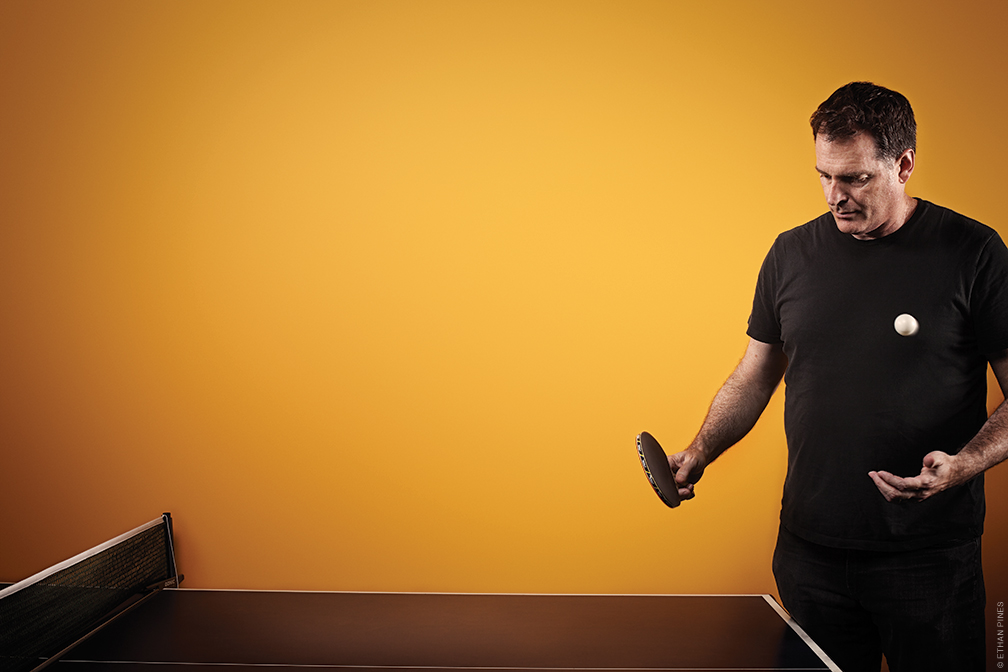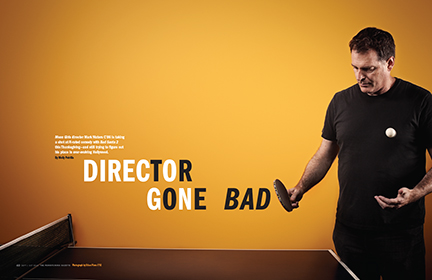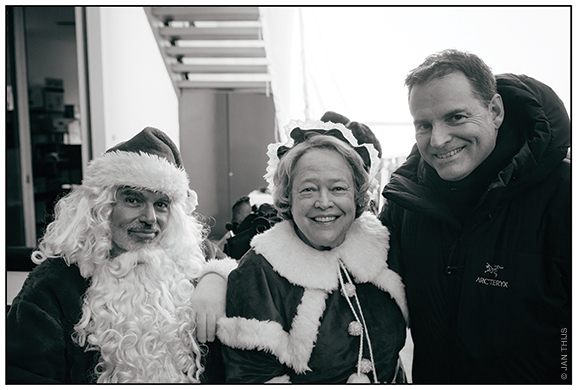
Mean Girls director Mark Waters C’86 is taking a shot at R-rated comedy with Bad Santa 2 this Thanksgiving—and still trying to figure out his place in ever-evolving Hollywood.
BY MOLLY PETRILLA | Photograph by Ethan Pines

Here’s what directing a big-budget Hollywood movie is like, at least if you’re Mark Waters C’86 making The Spiderwick Chronicles in 2007:
You show up to shoot in Montreal just before the leaves have left the trees. It turns out to be the rainiest fall in recent history—freezing cold, too.
You get used to standing outside in your jacket, water slipping down your hood, the chill knocking into your bones, waiting for any break in the rain so you can film something. When one finally comes, you run the actors out under umbrellas, shoot a scene, and mutter to your director of photography, “Yeah, I don’t think we can see the rain in that.”
You coach a kid who’s playing identical twins and has to argue with his invisible second self. He’s also having trouble pulling off an American accent.
One studio president hires you, another shows up for script development, a third for the actual production process. You edit the movie with a fourth executive, then plan its release with a fifth. Each of those five bosses has a different idea of what the movie should be. You fight every day to keep your own vision for it intact.
“A hair-pulling experience” is how Waters sums all this up. “But no one cares at the end of the day because the movie came out well and it made money.” Just over $162 million, to be exact. It also landed a near-perfect rating from Roger Ebert: three-and-a-half stars out of four.
So that’s what happened the last time Mark Waters made a movie in Montreal. Of the 10 feature films he’s directed, he says it was the toughest one to pull off.
But this past winter he went back to the shivery Canadian city and shot another movie—one with a smaller budget, dirty jokes, and hard edges. One that may redirect his 20-year career in Hollywood.
It’s a movie about Santa, but not the jolly one. The alcoholic, thieving, pissed-off one. Billy Bob Thornton’s Bad Santa.
For the past two decades, Waters has been making movies that families want to watch together and teen girls want to crawl inside. Spiderwick has goblins, faeries, trolls, and a PG rating. Mr. Popper’s Penguins (2011) is based on the beloved 1938 children’s book. Vampire Academy (2014) came from a YA fiction series. A handful of romantic comedies show love at its PG-13iest.
When the first Bad Santa came out in 2003, Waters was starting work on Mean Girls and had just finished Freaky Friday—a Disney remake of the 1976 original. Both movies starred Lindsay Lohan. Both dealt with familiar teen issues (moms can be so annoying! popular girls, ugh!). Both quickly entered the teen girl canon.
Waters knows that Bad Santa 2, due out this Thanksgiving, is his first chance to show audiences and studio execs that he can make funny movies for adults. It’s the first raunchy, R-rated comedy he’s ever done.
“It means that in the future, people aren’t going to say, ‘Oh, Mark Waters, he can only do family films or teen girl movies,’” Waters says. At least, that’s the plan.
Waters broke into Hollywood 20 years ago with a very different type of family movie from the ones he’s made since.
The House of Yes stars Parker Posey and Josh Hamilton as twins who turn the Kennedy assassination into foreplay for their incest. (Sample lines, delivered by their mom: “Jackie and Marty belong to each other. Jackie’s hand was holding Marty’s penis when they came out of the womb.”)
Waters adapted Yes from a play with the same name. His version had a $1.5 million budget, one location, five actors—and soon a splashy debut at the 1997 Sundance Film Festival.
“It was a feeding frenzy,” says Jessica Tuchinsky, Waters’s former agent and current producing partner. Studios bid for the movie and agents scrambled to land Waters. “Everybody was like, who’s Mark Waters? How can we get to Mark Waters?” Tuchinsky remembers. He became her first client, and she represented him for the next nine years.
But instead of chasing more indie success, Waters followed Yes with a PG-13 romantic comedy starring Freddie Prinze, Jr. (Head Over Heels ), then drove further into the family-friendly lane with Freaky Friday. He’s hovered there ever since, right up until Bad Santa 2.
How did he go from sibling incest to a PG comedy about body-switching mother and daughter? Waters says he took on Friday partly at the urging of his wife, actress Dina Spybey Waters. He interviewed for the directing job while she was pregnant with their first daughter. Suddenly a story about mother-daughter relationships felt personal.
When the movie turned a $140 million profit, Waters jumped onto Hollywood’s radar as someone who could pull off a popular family film. “And obviously it’s something I’m attracted to,” he says. “I like the idea of trying to please the parents and the kids.”
Besides, the real-life Waters is more Freaky Friday than Bad Santa 2, at least according to Andrew Gunn, a producer on both movies. “He’s got daughters. He calls his wife ‘Bunny.’ They live down in Laguna,” he says. “It’s all very squeaky clean.”
In explaining Waters’s resume, Gunn says it’s easy to be typecast in Hollywood as the person who can do X thing. Studio executives want a director who’s already made family comedies to direct their next family comedy. They don’t want him for their next R-rated drama.
Of course, Waters has nothing against teen girl movies, either. He likes making them, and he says it isn’t hard to understand the characters, even as a middle-aged man. “We’re all teenage girls, you know?” he says. Waters laughs at this, but he isn’t kidding.
“The fact is, everyone is insecure, everyone has body image issues, everyone has issues about popularity. Boys are just better at hiding it, but we all relate to these things.”
Mark Waters doesn’t assume that you’ve seen every Mark Waters movie out there.
He goes to football games at his daughter’s high school on Friday nights.
Friends say he talks to the screen in movie theaters (“don’t go in there!”) and has an insanely loud laugh—an ear-popping “HA!”
Even after 20 years in Hollywood, “he’s as regular a person as I know,” Tuchinsky says. “Some directors are mercurial—such assholes. Mark’s the most easygoing, friendly, nicest guy who knows exactly what he wants.”
As Waters himself puts it: “I am somebody who’s brutally honest, yet in a very friendly way. It leads to having really good friends, but also some people going, ‘Man, I can’t handle Waters, I have to get away from him.’”
On set, he says that brutal honesty is aimed at himself rather than the actors. They get gentle encouragement instead, and he tries to keep it short and simple. Faster or slower or attack her more. He finds that those nudges often change a clunker into the right note.
“He’s a very good actor’s director,” Gunn says.
Waters has been working with actors since the early 1990s, when he moved from acting in plays to directing them.
He’d never been a movie buff, but he also started visiting his older brother Daniel on sets around that time. A screenwriter whose credits include Heathers—the 1988 dark comedy featuring croquet, murder, and big perms—and Batman Returns (1992), Daniel was “the hottest writer in show business” in those years, Tuchinsky says.
But on sets that he’s too polite to name, Mark saw his brother’s funny scripts drained of their punch. The actors flailed, and often directors refused to toss them a life raft.
“I remember having this moment of insight: If I could learn about these cameras and cranes and shit, I think I could do this,” he says.
He started making Super 8 short films and got into the American Film Institute with one called Betrayals. It follows a couple who use their “weird obsessions,” Waters says, in place of having sex: chocolate for her; autoerotic asphyxia for him.
Waters thought he’d made a comedy, but he says the head of the American Film Institute told him it was “a great dark drama with very strong cinematic images” and accepted him into AFI’s Master of Fine Arts program in directing.
In the 20 years since he graduated from AFI and began making feature films, directing has meant telling Jim Carrey to shove fish into his pockets so penguins would follow him around. It’s been helping Tina Fey find the perfect “mean girls” and holing up in a tent with Billy Bob Thornton and Kathy Bates after rehearsal to punch up scripted lines.
“If he weren’t a director,” Tuchinsky says, “I think he’d be a coach for an NFL team. He can get the best out of each individual performer.”
Extending the analogy, she says Waters shows up with a clear plan for each day of shooting, but also leans into any changes that arise. It’s his job to make quick, confident decisions—and often more than a hundred cast and crew members are waiting on the answers.
Mean Girls is still the title that follows Waters’s name in articles and tops his IMDB page under “Known For,” yet he almost passed on it at the time. Fresh off of Freaky Friday, he didn’t want to direct any more scenes that started with locker doors slamming.
“But the script was hilarious,” he says of Mean Girls, which was written by Tina Fey and going by Homeschooled when he first saw it. “It was R-rated, too. Filled with cussing. Regina George had more ‘fucks’ than Joe Pesci in Goodfellas. I was like, this is kind of great, but I’m cautious about it.”
In Mean Girls, the main character Cady (Lohan) emerges from homeschooling to attend a clique-y high school. She’s drawn to the queen bee group, led by “evil in a human form” Regina George and her “army of skanks.” After some backstabbing and subterfuge, Cady learns it’s better to do her own thing.
Fey eventually toned the script down to PG-13, and with Waters directing, Mean Girls became a cultural touchstone that’s still spawning YouTube tributes and may even hit Broadway as a musical soon.
“If you’re an empathetic human being, you can relate to what goes on in Mean Girls,” he says, “including the idea that you would be attracted to the Regina Georges of the world, do anything to be close to that, then realize it’s something you don’t want to be a part of.”
It’s a feeling Waters struggled with himself at Penn. He came to Philadelphia from Indiana, the valedictorian of a high school class in which only half of graduates went on to college.
“I was a scholarship kid who was suddenly at the big show,” he says. “For me, Philadelphia was the Emerald City.”
He joined a fraternity, met “a lot of rich kids,” and got “sucked into the romance and allure of, ‘Wow, these people are living life at a different level than I am.’”
“I was definitely enamored with it and kind of pulled into it in a bad way for a short time,” he adds. “Then eventually I came out and realized I need to define myself as who I really am.”
But first those wealthy friends exposed him to something transformative. On weekend trips to Manhattan, where many of his new friends had grown up, Waters and his fraternity brothers would get wild and … go to the theatre?
Up until then, he’d only seen plays at his own high school, and he thought they were cheesy. In New York, he went to off-off-Broadway productions at The Performing Garage. “There was an edge and a provocativeness that I couldn’t deny and that ended up becoming my inspiration,” he says.
Back at Penn, Waters enrolled in a theatre class called Movement and Mime. He directed a skit at the end of the semester and put on a solo performance of Samuel Beckett’s Act Without Words. He still remembers the rush of that first time on stage.
“You get a lot of approbation from performing,” he says. “It’s like why kids pick up a guitar and join a rock band: because girls like it. So there’s a thing of like, ‘Girls are really interested in me after I come off stage. I don’t know why. But I think I might do it again because it seems to have that effect.’”
He took a few classes at the Wilma Theater in Center City and performed there in Orphans, which proves he must have been a decent actor. Right?
“You know what I was?” Waters says. “I was like a TV actor on an NCIS episode where you’re like, ‘He’s very pleasant to look at and says his lines without stumbling.’ But that’s not good acting, and I was aware of it at the time.”
When he graduated from Penn in 1986 with an economics degree, Waters used the money he’d saved from bartending at La Terrasse to travel around Europe. He lived in Berlin and taught English, then moved to San Francisco to launch an acting career in 1988.
“For years and years, I was poor as ever,” he says. He survived on one steak burrito a day, carving it up to last for three meals. He also juggled three jobs, including bartending for a catering company.
One day he showed up to work at a ritzy wedding in Palo Alto and found himself waiting on a bunch of guys he knew from Penn.
“They were like, ‘Waters, what are you doing serving crudité?’” he remembers. “It was slightly embarrassing, but I was willing to be poor to be able to do the creative work I wanted to do.”
Even with 10 feature films on his directing resume, an 11-year-old production company (Watermark Pictures), and a new chance to make bawdy adult comedies, Waters admits he’s still “trying to find my place” in Hollywood.
“I’m into things that work best on a low and medium budget—kind of the middle class of filmmaking—which really has been squeezed out,” he says. “I’m never going to be the guy who wants to do Thor 3 or one of those big-budget, major tent- pole movies. That’s not my style. I’m into character and comedy.”
Waters’s personal favorite among the films he’s made, Just Like Heaven (2005), stars Reese Witherspoon and Mark Ruffalo as meet-cuters with a twist: she’s a spirit but not a full-fledged ghost, and only he can see her. A.O. Scott declared it “a bit too thin and gooey” in his New York Times review, yet in the next sentence said it’s also “impressively nimble and cheery.”
The movie has a 75 percent “fresh” score from users on Rotten Tomatoes and a 56 percent from critics. For Mr. Popper’s Penguins,the “rotten” reviews actually outnumber the “fresh” ones.
Waters tends to ignore stuff like that. He doesn’t read bad reviews. If he does wander onto a review site like Rotten Tomatoes or Metacritic, he’ll sort the reviews so that only the good ones show up, and look at those.
This isn’t theatre. He can’t make adjustments after reading the opening-night reviews. “I’m not going to go back and re-edit the movie,” he says, “so it means nothing to hear that somebody doesn’t like it. It’s nothing but a negative.”
Sure, there have there been times when the feedback was so bad it bummed him out. When he made the rom-com Ghosts of Girlfriends Past in 2009, its leading man Matthew McConaughey was still a shirtless, bongo-playing punchline in real life. “The movie tested really well,” Waters remembers. “People loved it. Then the reviews came out and they were just savage.”
He says the disconnect between what reviewers like and what audiences actually enjoy extends to getting movies made in the first place.
“It’s extremely difficult to get these things set up,” he says. “That’s something people don’t understand. They look at your resume and say, ‘Oh, these are the 10 movies that he chose to do because he wanted to do them more than any other movie.’
“In fact, the greatest movies that I want to make haven’t been made. The best scripts I have are movies that are considered to be too tricky or too strange or unplaceable.”
Right now, for instance, he’d love to make a movie about when the Harlem Globetrotters beat the Minneapolis Lakers in a 1948 exhibition game, pushing the NBA toward integration. But he’s had trouble getting it in motion, even after the #OscarsSoWhite push for more diversity in Hollywood.
“That’s the dirty secret,” he says. “They say, ‘We want more diversity, but we can’t sell diversity overseas.’ And since they want to make movies for the foreign markets, they’re saying yes with one hand and no with the other.”
So how does Waters keep himself from getting discouraged and disillusioned with Hollywood, aware of its contradictions, hearing no so many more times than yes?
“I am discouraged and disillusioned by Hollywood,” he says. “But I’m also an indefatigable optimist.”
He knows that success in Hollywood was never promised. Even with his AFI pedigree, there was no system that let him start as an eager young assistant and work his way up to director. He had to squeeze into the business on his own through whatever gaps he could find.
“It’s very easy to just pull up your stakes and leave,” he says. “Most people I went to film school with are like that. But if you adopt the attitude that you’re never giving up and you’re never going to leave, through attrition you can sometimes have success.”

The original Bad Santa is about as upbeat as a bee sting. Billy Bob Thornton plays Willie T. Soke, an alcoholic con man who poses as Santa in department stores by day, then robs them at night.
Willie beats up some teenagers, talks in at least half-profanity, and wets himself more than once. His advice to a third-grader who asks for a stuffed animal: “Wish in one hand, shit in the other. See which one fills up first.”
But among those who prefer their Christmas movies with peppery bite, it’s become a holiday classic. Wedged between Elf and Love Actually in November 2003, when all three movies came out, it was an obvious antidote to all the sappy love and good cheer. Critics liked it, too.
Fans have been campaigning for a sequel ever since, and Thornton alluded to a second installment back in 2009. The sequel bounced around Hollywood for the next six years with various directors attached. Then last November, news broke that it was really, finally, actually happening, and that Waters would direct.
“I think that certainly internally, within the business, people were like, ‘Really? Mark Waters?’” says Gunn, who pushed for Waters to get the job. “But funny is funny. And I think it was also deliberate on Mark’s part to just want to stretch out a bit.”
Tuchinsky, who’s executive producing the movie along with Waters, confirms there’s plenty of raunch in the sequel—and a “very hard R” rating.
“Take the first one and push it a hundred times further,” she says. “I think the fans will be happy. I think if this is your introduction to Bad Santa, your jaw may drop.”
Amid all the deviant debauchery, she says Waters also brought an emotional depth to the movie that other directors may have missed. It’s the same balance between laughs and heart that Gunn says turned Freaky Friday into a hit.
“Mark is really good at weaving together funny characters and physical comedy without losing whatever deeper theme the movie might have,” Gunn adds.
When Bad Santa 2 comes out this November, it will be exactly 13 years since the original debuted. This time it will go up against a Brad Pitt spy movie (Allied) and a new Disney CGI-fest (Moana) at the box office. Will people still find a sinful Santa funny? Audience tastes are constantly shifting, so it’s impossible to predict whether the sequel will outshine its predecessor or miss the mark.
Tuchinsky knows that Waters will be fine either way, though.
“In Mark’s career he’s had ups and he’s had downs,” she says. “He’s been the most sought after director and the least sought after director. He’s been a newbie, he’s been the old guard. But from his first film onward, he’s always been the same person: completely normal and refreshingly easy.”
Waters has been thinking about doing something a little different soon. He’d like to direct a full TV series season (“It’s kind of like the independent film movement of the ’70s is now happening on TV,” he says) or maybe show up at Sundance with a small-budget movie—a veteran now instead of a rookie.
“I think Mark can do just about anything,” Tuchinsky says. “It just has to interest him.”
But what about his legacy—that pesky word that haunts so many people?
“I don’t necessarily think like that,” he says. “I just enjoy getting the work out. The thing that appeals to me is that I’ve created a body of work and people can watch my movies 50 years from now and hopefully still gain some enjoyment from them.
“That’s kinda cool,” he adds. “That pleases me.”
Molly Petrilla C’06 writes frequently on arts and culture and other subjects for the Gazette.




